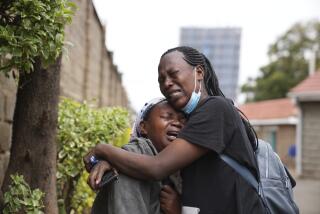28 bus passengers killed in Kenya after failing to recite Quran verse
Reporting from Melbourne, Australia â The Somali terror group Shabab on Saturday claimed responsibility for the massacre of 28 bus passengers, killed in an early morning attack near the Somali border in northern Kenya.
Around 60 people, including the passengers and bus driver, were ordered off a bus bound for Nairobi, then questioned by the terrorists, who separated Muslims from non-Muslims, according to officials.
âI can confirm that 28 innocent travelers were brutally executed by Al Shabab,â regional police chief Noah Mwavinda told local media. He said gunmen ordered passengers to recite a Koranic verse: anyone who couldnât was killed. The attack follows the pattern of previous terror attacks in Kenya where Muslims have been spared and others killed.
The non-Muslims were ordered to lie down and were shot in the head. At least nine women were killed, according Kenyan officials on Twitter.
A chilling photograph depicted the horror: men and women lying face down on grassy roadside, each shot in the head. Some of the victimsâ heads were shattered by the gun shots. Pools of blood seeped into the ground.
Shabab said in a statement Saturday that the attack was in revenge for actions by Kenyan âcrusadersâ against Muslims.
Four police, two border officials, the bus driver, health workers and schoolteachers were among the dead, according to local officials.
The attack happened near the town of Mandera, in northern Kenya, a few miles from the northern border with Somalia, according to Kenyaâs National Disaster Operation Center.
The NDOC and the Interior Ministry tweeted Saturday that the attackersâ base camps had been located by the Kenyan military and destroyed, with many militants killed. There were reports of helicopters and explosions in the village Omar Jillao in the wake of Saturdayâs attack.
Shabab, an extremist Islamic terror militia linked with Al Qaeda, and its affiliates in Kenya have carried out dozens of deadly attacks in Kenya since 2011 when Kenyan troops were deployed in Somalia in response to a series of kidnappings of Western tourists and aid workers in northern and coastal Kenya.
Shabab said the bus attack was in revenge for the suffering of Muslims in the coastal town of Mombasa. Police raided and closed down mosques and arrested hundreds of people in an operation they said was aimed at destroying extremist cells. At least one person was shot dead by police in the operation.
Police said they found explosive materials and extremist literature in the raids.
Shabab is fighting the UN-backed Somali government, recently losing territory to Somali forces and AMISOM, but has also carried out frequent attacks in Kenya.
âThe hearts of Muslims all over have been left in anguish in the light of events in recent days which affected our brethren in Mombasa, from the desecration of mosques, killings, arrests and other violations of rights and sanctities,â the statement from Shabab spokesman Sheikh Ali Mohamud Rage said. He said Shahab âresolved not to let these crimes go unpunished.â
âAs for the Kenyan crusaders, you are fighting a losing battle against Islam, you have previously tasted the bitter reactions of your crusade campaign, and just as we have warned you before, we reiterate to you that you will have no safety until you cease your hostilities against Muslims.
Shabab leader Ahmed Abdi Godane was killed in a U.S. airstrike in September, weakening the group, which has seen desertions since
Last year Shabab gunmen attacked a popular Nairobi shopping mall, killing at least 67 people. Earlier this year, extremists carried out a series of attacks on villages near Kenyaâs cost, killing dozens of people. In both cases, survivors reported that gunmen questioned people about whether they were Muslims, freeing those who were, but shooting non-Muslims.
Kenyans have criticized Kenyan authorities for failing to protect the population against terror attacks and for ignoring warnings of impending attacks. But Kenyaâs porous northern border with Somalia makes it difficult to prevent Shabab militants from infiltrating Kenya and carrying out attacks, particularly in the north.
The governor of Mandera County, Ali Ibrahim Roba, said authorities had downplayed the threat of terrorist attacks in Kenyaâs border regions near Somalia.
âWe always react after events,â he said on Twitter. âKenyans must stand together. Terrorists must not incite Kenyans against each other.â
âThis place has been prone to attacks. This is not the first time the government has totally ignored us, and you can now see how many innocent precious lives have been lost,â according to a local official Abdullahi Abdirahman, the Daily Nation newspaper reported.
The Kenyan Interior Ministry said on Twitter the attack was a crime carried out by âbandits.â
âSome leaders have been inciting Kenyans against religious lines. But I clarify that this is a criminal gang,â Secretary Joseph Ole Lenku said Saturday, according to the Interior Ministry.
Kenyan police chief David Kimaiyo said in a statement Saturday that buses in the area would be escorted by armed security forces.
In televised remarks, Kenyan Deputy President William Ruto said: âI want to assure you all that all those responsible for the loss of lives of Kenyans - we will pursue you everywhere, be it in Kenya, be it in Somalia.â
Reuters contributed to this report
More to Read
Sign up for Essential California
The most important California stories and recommendations in your inbox every morning.
You may occasionally receive promotional content from the Los Angeles Times.










